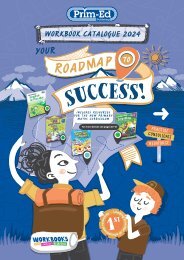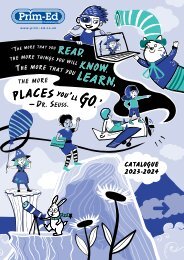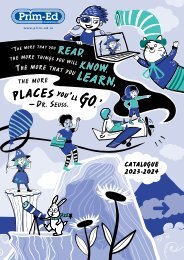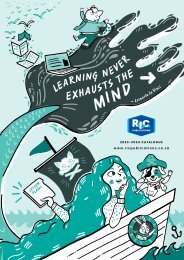RIC-20802_Teaching_Strategies_for_Writing_BkE_word_choices
You also want an ePaper? Increase the reach of your titles
YUMPU automatically turns print PDFs into web optimized ePapers that Google loves.
TEACHER INFORMATION<br />
VERBS, DESCRIPTIVE AND<br />
OVERUSED VERBS, ADVERBIALS<br />
UNIT 3<br />
Focus<br />
Word <strong>choices</strong> – verbs, descriptive verbs, overused verbs,<br />
adverbials<br />
Progression<br />
Recognise<br />
Students will recognise a verb/adverbial from modelled examples.<br />
Choose<br />
Students will choose the more or most in<strong>for</strong>mative verb/adverbial<br />
from given examples, with teacher support.<br />
Use<br />
Students will choose and use appropriate, in<strong>for</strong>mative verbs/<br />
adverbials in supplied and self-written sentences.<br />
Definition of terms<br />
Verbs or ‘doing’ <strong>word</strong>s show actions or states of being or having.<br />
A verb group is a verb combined with other, auxiliary, verbs.<br />
An action verb is one which describes an action or feeling.<br />
Adverbials are <strong>word</strong>s or groups of <strong>word</strong>s that add in<strong>for</strong>mation,<br />
usually to a verb or verb group. They can tell how (manner), when<br />
(time) or where (place) something happens. Adverbs can modify<br />
(add in<strong>for</strong>mation to) any <strong>word</strong>s that are not nouns or pronouns.<br />
(These are modified by adjectives.)<br />
Introduction<br />
Good writers improve their writing by their choice of in<strong>for</strong>mative<br />
and appropriate verbs and adverbials.<br />
LESSON NOTES AND PLANS<br />
Introduction<br />
• Discuss the text title with the class. Why would the author say the<br />
fireworks were ‘dancing’ in the sky? Discuss what else fireworks<br />
might do in the sky. Elicit answers such as ‘explode’, ‘flash’, ‘burst’.<br />
Point out that these are verbs or verb groups that show (in this case)<br />
an action.<br />
• Read the text with students. Discuss the type of text it is (in<strong>for</strong>mation<br />
report). Use questioning to remind students of the features of this<br />
text type.<br />
• Show by example how careful choice of action verbs can lead to<br />
a clearer understanding by the reader. (For example, ‘Gunpowder<br />
burns quickly’ vs ‘Gunpowder flashes into bright flames’.)<br />
Descriptive verbs – Page 17<br />
• Read and discuss the in<strong>for</strong>mation at the top of the page.<br />
• Discuss why verbs are an important part of every sentence and why<br />
it is important <strong>for</strong> writers to think about verbs and choose good,<br />
interesting and in<strong>for</strong>mative verbs.<br />
• Work through the activities with the class as a whole, ensuring they<br />
understand what is required of them.<br />
• Work with those requiring additional assistance while the remainder<br />
of the class work independently on the activities.<br />
Overused verbs – Page 18<br />
• Review students’ understanding of the term ‘verb’ and ask them to<br />
provide examples.<br />
• Discuss the overuse of (pallid) boring verbs like saw, went and said<br />
and give alternatives <strong>for</strong> said, such as yelled, screamed, whispered.<br />
• Explain that better verbs can give more in<strong>for</strong>mation about what is<br />
happening and can change the meaning of a sentence.<br />
• Brainstorm and list more in<strong>for</strong>mative verbs <strong>for</strong> got. This will assist<br />
the class to complete the questions on the page.<br />
• Provide opportunities <strong>for</strong> the class to share the paragraphs they<br />
wrote <strong>for</strong> Question 5.<br />
Descriptive adverbials – Page 19<br />
• Read and discuss the definition of adverbials and the examples<br />
given.<br />
• Explain that good writers add adverbials to give the reader more<br />
in<strong>for</strong>mation about verbs and to make their writing more interesting.<br />
• Brainstorm and make three lists of adverbials that could tell how,<br />
when and where an explosion occurred; e.g. how — loudly, with a<br />
loud bang; when — later that day; where — high in the night sky.<br />
• Work through the activities with those requiring assistance. Others<br />
should complete the activities independently.<br />
14<br />
TEACHING STRATEGIES FOR WRITING (Book E)<br />
www.ricpublications.com.au


















